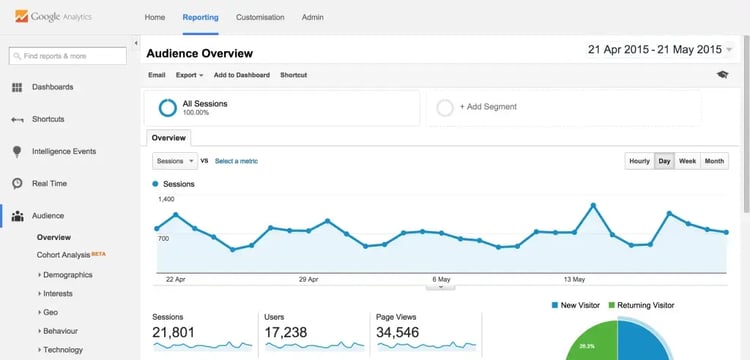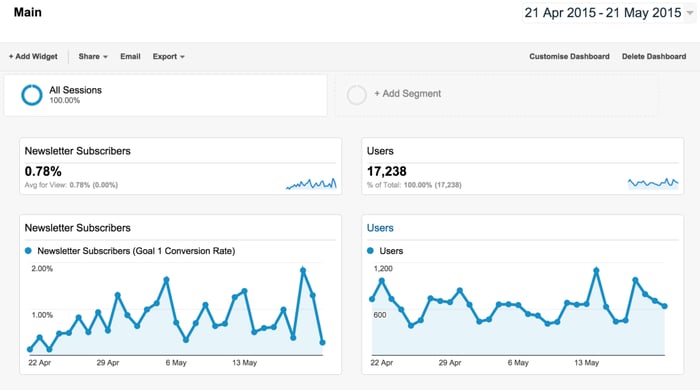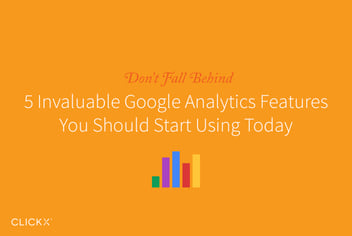Supercharge Your Small Business’ Online Presence With Google Analytics
If you’re a small business owner looking to maximize the impact of your website and online presence, you need Google Analytics. It is the most effective and straightforward way to see what you’re doing right, what you’re doing wrong, and what you need to be doing next.
[Tweet “Maximize the impact of your website and online presence with Google Analytics #smb”]
Analytics will show you the essential facts about your audience, who they are and where they’re from. But most importantly, it will show you how they’re using your website and whether it’s having the intended effect.
Google Analytics will help you focus marketing efforts and cut out parts of your strategy that are fruitless. You don’t need to be a data analyst — it’s easy for anyone to use. The best part? It’s free.
In this post, I will tell you what you need to consider to get the most out of it.

Learn the Lingo
The sheer volume of numbers, graphs and industry jargon on Google Analytics can be overwhelming, but stick with it.

It can look overwhelming, but don’t panic!
It’s important that you make the effort to learn what Google Analytics can do. Many people will give up or only use the basics, and this will hinder their progress.
Some of the most useful features include:
- Total Number of Visitors and Views: You can see this for the site as a whole, or for specific pages.
- Returning and New Visitors: See if your audience is made up of repeat users or newbies.
- Source Data: How users have reached your site (search engine, social media, referrals, etc.).
- Bounce Rate: How many people leave your site after seeing only one page.
- Tracking In-Site Searches: If you have a search bar on your site, you can track what people type in — a really easy way to see exactly what people are looking for!
Becoming familiar with the ins and outs through an online course will immediately put you ahead of many other users. Google offer a number of courses, seminars and videos through their Analytics Academy, which will help you get started and on your way to becoming an expert. Spend time going through these.
Set Clear and Quantifiable Goals
Have a clear set of goals that you want to achieve with your website. For larger businesses, these can usually be boiled down to getting people to spend money on the site. For smaller businesses however, there is a much wider variety of potential goals.
You might want to to:
- Gain exposure for a specific product or service
- Direct people to your contact page so that they know how to get in touch
- Gain traffic on your testimonials page so that people know how great your business is
- Get people to share your website on social media and gain even further exposure
There are many others, and goals can vary from industry to industry. One website might need customers to sign up for a newsletter, so this would only require them to visit one page; another website may want customers to browse to learn about the company, and so multiple pages is a better goal.
Work out your business’s goals and keep them in mind as you consider your analytics. Program them in as ‘conversions’, and Analytics will track how well your website is doing.
Make Google Analytics Work for You!
By putting in the time to learn about Google Analytics, the hardest part is done. Now you can streamline and organize your data to make it even simpler.
Custom Dashboards

By now you’ll be familiar with the various screens around the Analytics system, though these can seem a little scattered and may contain data that you’re not interested in.
Luckily, it’s possible to create your own dashboards, to keep your most vital data in one convenient place. This means that you only need to check one screen for all of your analytics.
Custom Email Alerts
It might be that you only need to check your stats on a weekly or monthly basis. At that frequency, it could be easy to forget. Custom email reports will send everything that you need to know straight to your inbox to keep you up to date.
Annotations
Analytics enable you to annotate your data so that you get a clearer picture of what affects it. You could mark the date of a Twitter promotion and see if your traffic from Twitter increases after this point, or if you have some technical difficulties that cause numbers to drop off, you could mark this too.
Play Detective
When you look over your chosen stats, you’ll need to do some investigative work to figure out what’s linked. A rise in visitor numbers could be because of a referral from another site (as shown in your source data), or a high bounce rate could be due to a broken page.
All of the data can play into each other, and as long as you are involved with it, you will be more able to spotting the trends.
Keep the Balance
High visitor numbers alone won’t prove that your website is doing the trick. You could have a 20% increase in visitors (which seems great!) but a 20% increase in bounce rate (which isn’t so great). Making sure that your numbers all keep to targets is like spinning plates, and if one is out of sync, something is wrong.
Act On What You’ve Learnt
All of the data on Google Analytics is potentially valuable. Ultimately, your analytics will give you feedback on how to run your site and your marketing campaigns. You might see that most of your return visitor numbers are dropping, so you decide to increase your email marketing to bring some back. On the other hand, you might see that all visitors using mobile browsers leave after just a few seconds on their first page, which will make you question whether your site is truly mobile-friendly.
The key thing is to use your data to understand who your audience are and what they’re doing on your site, and ensure that your website and marketing strategies are targeted using this information.
If It Goes Well…
If what you’re doing is working, then great! Take on board that your strategy is a success, and consider how you can maintain that or optimize your setup to improve further, keeping an eye on the data as you go.
If There’s Room For Improvement
If you’re not seeing the results you were hoping for, don’t see it as a defeat. Instead, think about how you can use this information to improve in future.
This could be minor tweaks or big strategy changes. For example, you might see that you are not getting many visitors from paid adverts. Rather than seeing the adverts as a waste of time, recognize that this failure has ruled out one plan, given you more insight to work with, and taken you one step closer to a better approach.
Conclusion
Google Analytics will provide the most valuable information on how well your website is doing, and making the most of it can be extremely rewarding for your business. However, you need to be proactive in learning about its capabilities and focused on what you want to gain from it, in order to reap the benefits.
Have you had any particular successes with Google Analytics? Let us know in the comments section below!






